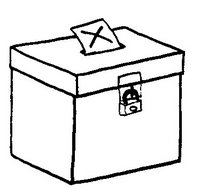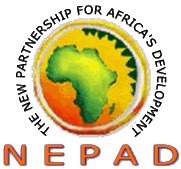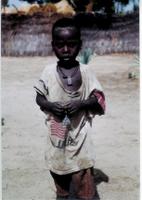 Freedom fighter, patriot, "revolutionary hero". Robert Mugabe has held many titles, but his most recent is perhaps most fitting according to Stacey H., below: cartoon figure of the archetypal African dictator". Two guest bloggers, Stacey H., and Kate D., offer their perspectives on the issues.
Freedom fighter, patriot, "revolutionary hero". Robert Mugabe has held many titles, but his most recent is perhaps most fitting according to Stacey H., below: cartoon figure of the archetypal African dictator". Two guest bloggers, Stacey H., and Kate D., offer their perspectives on the issues.
Mugabe: The Face of ZimbabweA person’s first impression of Africa usually focuses on negative aspects plaguing the continent like poverty, AIDS, and genocide. Africa has its success stories that can prove those initial impressions wrong, but countries like Zimbabwe only encourage the stereotype that many Africans are trying to disprove. Once hopeful and growing, Zimbabwe has taken a turn for the worse. It became independent in 1980 at the end of a struggle that transferred control from a small white community to current President Robert Mugabe. Initially, it appeared as though Mugabe would improve stability throughout the country. Zimbabwe had the ability to prosper because of its promising markets built around tobacco, agricultural products, and cotton. Nowadays, Mugabe’s country is plagued with poverty, high unemployment rates, civil strife, and a weakening economy. It is clear that Mugabe has been causing more harm than good, leading Zimbabwe into a crisis.
Beginning with the Land Acquisition Act of 1992, President Mugabe has been obtaining land for redistribution. Following the land seizures, government-backed militia killed several white farmers and their workers. Over the past five years, Mugabe has increasingly allowed the seizure of white-owned commercial farms, providing his supporters with the opportunity to prosper. However, Mugabe’s plan has decreased Zimbabwe’s overall production, leading to the breakdown of its agricultural-based economy. In April of 2002, the government declared a state of disaster charging that a drought had generated food shortages. Mugabe has also claimed that the people in Zimbabwe are “very, very happy” and not going hungry, despite aid organizations’ estimates that 4-11.6 million Zimbabweans are facing starvation [1].
People continue to blame drought for Zimbabwe’s deteriorating situation, but recently, Deputy Agriculture Minister Sylvester Nguni explained “that people without the slightest idea of farming got land” [2]. Even Zimbabwe’s Central Bank governor expressed that the Zimbabweans were using their new land in a “criminal” manner [3]. Zimbabwe’s agricultural output has been dropping since the land reform program intensified in 2000. Also, its overall economy and way of life have been suffering. In 2002, 70% of Zimbabwe’s population lived below the poverty line as opposed to the 60% in 2000 [4]. Also, Zimbabwe has the world’s fourth worst rate of HIV/AIDS and the highest rise in child mortality of any nation [5]. Christopher Dell, the United States ambassador to Zimbabwe said that “the Zimbabwe government’s own gross mismanagement of the economy and its corrupt rule has brought on the crisis” [6]. Mugabe is unwilling to manage the crisis since he will not take responsibility for Zimbabwe’s growing problems.
One of Mugabe’s most recent projects was his “Operation Murambatsvina” or “Operation Clear the Filth” beginning on May 19th, which involved the arbitrary destruction of urban slums and “illegal” buildings. The destruction displaced thousands into rural areas without access to health care, clean water, and economic support. Mugabe claimed the demolitions would increase law and order in the cities, as well as development. However, the UN has estimated that 700,000 people have been left without jobs or homes [7]. Audrey Gaughran, an Amnesty researcher asserted that Operation Murambatsvina was “the latest manifestation of a massive human rights problem in Zimbabwe that’s been going on for years” [8]. Mugabe’s government has also stalled UN aid to the many victims. However, The New York Times reported on the 18th that Zimbabwe is finally allowing the UN to construct around 2,500 homes for the victims. Mugabe had initially promised to build new homes, but the fulfillment of his promise has been lacking.
Ironically, Zimbabwe’s President Mugabe was originally deemed a freedom fighter, helping the former Rhodesia to independence by establishing a stable democracy. During the 1970s, the world viewed him as a “revolutionary hero, fighting racist white minority rule for the freedom of his people” [9]. However, the world is becoming more and more likely to call him autocratic, as well as a “cartoon figure of the archetypal African dictator” [10]. Typically, Zimbabwe’s current problems are not a product of colonialism, but stem from Mugabe’s rule. Zimbabwe’s economy is suffering and it is going in the direction of a failing state.
The international community has tried to put pressure on Mugabe, but it has been unsuccessful with diminishing his power. The European Union has imposed sanctions against Zimbabwe’s political elite and the IMF has demanded fiscal reforms to mend Zimbabwe’s economy that is struggling with “a jobless rate of over 70 percent, triple digit inflation and acute struggles” [11]. The efforts to reduce Mugabe’s power have not been effective and have only increased his resistance to the west. Under Mugabe’s rule, Zimbabwe “has suffered an economic decline of 40% in recent years and a brain drain that is probably irreversible” [12]. Because of Zimbabwe’s growing problems, emigration is becoming more common, with hundreds of thousands leaving [13]. Many migrants, including white farmers, have cited economic and political factors as reasons for leaving. Clearly, there is no progress in resolving Zimbabwe’s growing crisis. Investors have begun to loose confidence, while media laws have become more restrictive and inflation has reached 254.8% [14].
As Zimbabwe’s problems have begun to worsen, Mugabe plans on running in the next presidential election in 2008. By then, he will have finished another six-year term at the age of 84, marking 28 years in power. Recently, Mugabe’s opposition, the Movement for Democratic Change (MDC), has been trying to gain control. However, the party has lost three national elections that were allegedly rigged. Adding to the MDC’s inability to gain power are documented cases of political intimidation of opposition parties and their supporters [15]. Without a solid opposition, Mugabe is able to strengthen his authority. Just recently, a bill was introduced that would create a new 40-seat Senate, remove landowners’ right to appeal against expropriation, and deny passports to Mugabe’s critics. Mugabe knows how to maximize his power as president and prevent others from speaking out. Unless a civil war breaks out or he finally dies, Mugabe and his party will stay in power, only to ruin Zimbabwe.
Check Out this Site (It’s a slideshow):
http://news.bbc.co.uk/1/shared/spl/hi/picture_gallery/05/africa_zimbabwe_artists_face_the_crisis/html/1.stm If you go to this site, you can see video of Zimbabwe’s conditions (top of left column):
http://news.bbc.co.uk/2/hi/africa/4395472.stm
[1] “Mugabe: ‘People Very Happy.’” News24.com. 19 September 2005. 15 October
2005.
[2] “Zimbabwe Admits ‘errors’ on Land.” BBC News. 1 November 2005. 13 November
2005.
[3] “Zimbabwe’s Poverty is Man-Made.” Business Report. 21 September 2005. 15
October 2005.
[4] “Zimbabwe.” CIA World Fact Book. 1 November 2005. 13 November 2005.
[5] “UNICEF releases statistics on Zimbabwe’s forgotten children.” 17 March 2005. 13
November 2005.
[6] “U.S. Envoy Blames Mugabe for Crisis.” CNN.com. 3 November 2005. 4 November
2005.
[7] “Country Profile: Zimbabwe.” BBC News. 5 October 2005. 13 November 2005.
[8] “Report: Zimbabweans Dumped in Slum Camps.” ZWNEWS.com. 20 August 2005.
29 October 2005.
[9] “Mugabe: Going Strong after 25 years.” September 2005. 13 November 2005.
[10] “Mugabe: Going Strong after 25 years.” September 2005. 13 November 2005.
[11] “Zimbabwe Seen in Deeper Hole after Constitution Vote.” 13 August 2005. 13
November 2005.
[13] “So Where Are Zimbabweans Going?” 11 August 2005. 13 November 2005.
[14] “Zimbabwe Presses Constitution Changes.” CNN.com. 18 August 2005. 29 October
2005.
[16] “Zimbabwe: Obstacles to Free and Fair Elections Documented.” Human Rights
Watch. 21 March 2005. 29 October 2005.
Zimbabwe: On a fast track to Disaster? by Katie D.
To say that Zimbabwe is simply on a path toward disaster would be a gross understatement of the situation. Since his election at the time of Zimbabwe’s independence in 1980, President Robert Mugabe and his ZANU-PF party have taken any possibility the country had for success and virtually thrown it down the drain. Mugabe’s most outrageous violations of the rule of law and human rights thus far have been the land reforms starting in 2000 and the slum clearance movement, which began in 2005. Both of these have already crippled the agricultural sector and left hundreds of thousands of Zimbabweans hungry, homeless, and without jobs. Even with Mugabe expected to resign in 2008, political turmoil within Zimbabwe continues to increase. The only substantial opposition to his ZANU-PF party, which is experiencing many of problems of their own, is the crumbling MDC party. As the MDC party deteriorates, and the ZANU-PF party continues to violate and starve its own people, the prospect of political stability in Zimbabwe is diminished.
Although Zimbabwe was once considered Southern Africa’s breadbasket, Zimbabweans are currently deep in a hunger crisis. Relief prospects seem grim due to the government’s crumbling relationship with NGO’s and other food aid donors. To make matters worse, President Mugabe has said, “if charity comes our way, we will use it…we don’t need America and we don’t need Britain”. He would rather ignore the absolute fact that millions are starving and continue to declare to the international community “Zimbabweans would choke if they were given any more food”. (1) HIV/AIDS presents another major problem in Zimbabwe, especially since many people dying of the disease are roughly between the ages of 18 and 30, and are the group most likely to bring democratic progress. The disease is strongly related to Zimbabwe’s problems of political stability and the recommendations that come out of research in this area show that in order for any democratization program to succeed, it must take HIV/AIDS into account. (2)
When he was first elected 25 years ago, President Mugabe expressed his commitment “to a process of national reconciliation and reconstruction as well as moderate socioeconomic change”. He also announced “that his government would begin investigating ways of reversing past discriminatory policies in land distribution, education, employment and wages”. (3) Knowing this it shouldn’t have surprised anyone when he followed through on his plan twenty years later. Mugabe began seizing white owned farms and redistributing them to landless blacks in addition to destroying countless homes and buildings in poor urban areas through his slum clearance operations known as “Operation Restore Order” or “Operation Murambatsvina” in 2005. The International Crisis Group’s report on this issue found that “Operation Murambatsvina cost some 700,000 Zimbabweans their homes or livelihoods or both and otherwise affected nearly a fifth of the troubled country’s population. Its impact, as documented in a scathing UN report, has produced a political shock that has returned Zimbabwe to the international spotlight and made the quality of its governance almost impossible for its regional neighbors to ignore, however difficult they find it to be overly critical.” (4)
Mugabe’s legacy of personal rule politics indicates clearly that he has no regard for the basic survival of many Zimbabweans, and he has put the country in a state of crisis. It is hard to pinpoint where one would start the process of positive change. Kofi Annan, the UN Secretary General, sent Anna Tibaijuka to Zimbabwe as his Special Envoy and she published her report in 2005, making details of Operation Murambatsvina available to the world. “Her findings show that the Zimbabwe government collectively mounted a brutal, ill-managed campaign against its own citizens. Whatever its intent—the urban clean-up claimed by authorities, or more sinister efforts to punish and break up the political opposition lest resentment explode into revolution—that campaign has exacerbated a desperate situation in a country already sliding downhill.” (4)
So why hasn’t the United States or some other world power intervened and attempted to fix the political problems and aid the suffering Zimbabwean masses? Maybe some would say it’s because of the lack of U.S. national interests in Zimbabwe, or perhaps wanting to give the African Union the chance to come up with solutions for problems on their own continent. While the US has not tried to change the governmental operations in Zimbabwe, the US did give almost $300 million in humanitarian assistance to Zimbabwe, mostly in the form of food aid, between 2002 and 2004. (3) The United Nations also has plans for a $30 million dollar humanitarian relief program but it has been stalled because the Mugabe government cannot agree to the terms of the plan with UN aid agencies. (5)
In October 2005, inflation rose to a staggering 411% in Zimbabwe, making it one of the highest rates in the world, and gas shortages are causing additional problems for industry and transport services. (6) The Zimbabwe National Reserve building in Harare is locally known as “Big Bob’s Takeaway” referring to Mugabe’s personal use of national funds. (7) The Zimbabwean economy is in serious disarray, and instead of trying to find new ways to generate wealth, Mugabe’s policies are only deepening the poverty. Even though a new system for foreign currency trade was introduced in October, little progress has been made because investors worry that the exchange rate will be controlled by Mugabe’s politics. Zimbabwe didn’t always have these problems; in fact, the nation was considered Africa’s second most industrialized country, that is until Mugabe began to dismantle it. Mugabe is now seeking stronger economic ties with Asia, rather than the US and Europe, however the economic outlook is still extremely grim.
Mugabe’s relations with many Western countries have deteriorated significantly over the past few years, primarily over charges of human rights violations and election rigging. Condoleezza Rice has referred to Zimbabwe as an outpost of tyranny, and even some of the Zimbabwean government officials are starting to admit to the wrongdoings and place blame with President Mugabe. Even though the EU has imposed sanctions on Zimbabwe’s political elite (including travel restrictions), Mugabe continues to travel to United Nations events where he makes a mockery of the UN, using his platforms to blast other world leaders, while being cheered on by many African delegates.
The United States and other world powers need to address the situation in Zimbabwe immediately, focusing first on helping those most in need and continuing to give food aid. Secondly, maintaining international pressure is key, and expanding the sanctions against Zimbabwean government officials should be part of this phase. Thirdly, the international community should support neighboring countries such as South Africa in their efforts to help Zimbabwe and conduct meaningful diplomacy. Most importantly, the US, the EU and the greater international community should “give no development assistance until there has been some meaningful progress toward political and economic reform, and then only upon the condition that specific further benchmarks are met.” (4)
Zimbabwe is most certainly on a fast track to disaster, if it hasn’t already arrived there. The rising poverty has forced thousands of the nations youth to make a living either as street vendors or prostitutes, worsening the HIV/AIDS epidemic. Faced with little opportunity in their own country, 3.5 million Zimbabweans have already sought jobs and homes abroad. (8) Parliamentary elections coming up on November 26th have caused new splits within the MDC opposition party and this election, like many before it, is not expected to produce much change.
(1) Thornycroft, Peta. “Food used to buy votes, judge finds”. October 18, 2005. National Post, (The Financial Post), Canada.
(2) Prabhala, Anna. “A Plague on Democracy- HIV/AIDS”. Elections Today- Summer/Fall 2001.
(3) U.S. Department of State, Background Note: Zimbabwe. Bureau of African Affairs, September 2005. http://www.state.gov/r/pa/ci/bgn/5479.htm
(4) International Crisis Group. “Zimbabwe’s Operation Murambatsvina: The Tipping Point?” Africa Report N.97, August 2005.
(5) “Rights groups seek action on Zimbabwe”, November 16, 2005. http://www.cnn.com/2005/WORLD/africa/11/16/zimbabwe.reut/index.html
(6) “Zimbabwe inflation hits 411%”, November 12, 2005. The Record (Kitchener-Waterloo, Ontario).
(7) Thomson, Alex. “An Introduction to African Politics”, Second Edition.
(8) Chinaka, Cris. “Zimbabweans travel a hard road to survive”, November 18, 2005. The Toronto Star.










